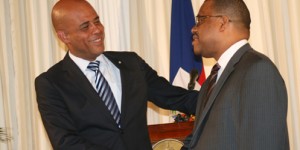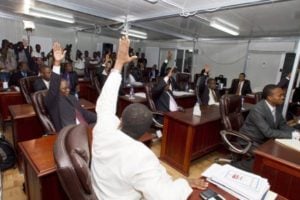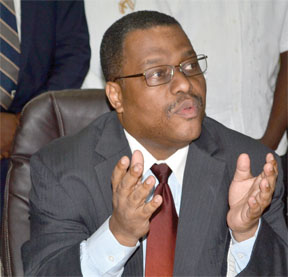
President Michel Martelly (left) welcomed Garry Conille (right) as PM
For Prime Minister Garry Conille, nearly five months of growing political tension sufficed to provoke his final decision. “I feel obligated to present my resignation as Prime Minister of the Government of Haiti,” he wrote to President Michel Martelly and leaders of the National Assembly. “Please, Mr. President,” he concluded, “Accept the assurance of my patriotic sentiments.”
The letter confirmed rumors of ongoing political maneuvers by the president to isolate Conille that engulfed the nation the past few weeks. Radio France International (RFI) affirmed, “It was under pressure from the head of state that Garry Conille finally resigned.” In fact, the presidents of both houses of parliament admitted to making a failed attempt at diffusing the political bomb; nevertheless, Martelly wanted nothing to do with it. During the weekly radio show Public Interest or “Interet Publique” in French, aired on Radio Kiskeya by legendary Journalist Liliane Pierre-Paul, Levaillant Louis-Jeune, who currently presides over the lower house, said the president’s response was crystal clear. “I don’t want him, need him and no longer want to lead with Garry Conille,” he said Martelly replied. Nevertheless, Conille insisted during a New York Times’ phone interview, “It was his decision to leave, not Mr. Martelly’s.”
Conille, 45, a medical doctor, former aid to UN’s special envoy to Haiti Bill Clinton and UN development expert, accessed the post of Prime Minister of Haiti following a four-month political gridlock. His narrow senate approval came after the Haitian parliament rejected Martelly’s first two nominations: businessman Daniel Rouzier and former Justice Minister Bernard Gousse. In spite of the president’s promise earlier this year to allow the new PM to play his partition, he often overshadowed Conille, who disagreed with him on important issues, such as the constitutional amendments, Haiti’s armed forces and a senate investigation into his citizenship status. After Senator Moise Jean-Charles alleged that the president and several administration Ministers held foreign passports, the senate launched an investigation into the allegations that, if confirmed, could force Martelly out of office. The Haitian Constitution strictly prohibits foreign nationals from meddling in national politics.

Voting Haitian Senate
However, many political analysts argued that Conille’s inquiring into reconstruction contracts his predecessor granted to Dominican firms ultimately decided his fate. The resigning PM launched a probe into about $600 million to $800 million in no-bid contracts awarded by former Prime Minister Jean-Max Bellerive, who is also Martelly’s cousin and serves on his advisory board. Several news reports indicated President Martelly vehemently opposed the audit, but Conille insisted on transparency. “They were negotiated under difficult circumstances,” he said, “and we wanted to make sure the state was well protected,” concluding that it made sense to look back.
Still, persisting rumors about contract-related funds financing Martelly’s presidential campaign also surfaced as a determining factor in the PM’s departure. Although Conille denied having any knowledge of such rumors, Dominican Ambassador to Haiti Ruben Silie felt compelled to issue a statement denying his country’s involvement. “We’ve nothing to do with Mr. Conille resignation, whose we regret,” declared the diplomat, according to the newspaper Dominican today. Silie maintained, “the contracts between Haitian authorities and Dominican companies during the crisis and shortly before Conille’s induction were private matters in which Dominican diplomacy and official policy didn’t intervene.”
Defending his decision to step down however, Conille indicated his government’s outright refusal to comply with his request to cooperate with the senate investigation signaled a lack of confidence in his leadership. “I decided it wasn’t going to work if they lost confidence in me,” he told the New York Times. Rather than fully cooperating with investigators, as Conille urged, his ministers pledged allegiance with the head of state, who declared the constitution gave the regulatory body no authority to conduct such an investigation, hence is noncompliance stance.

Resigning Prime Minister Garry Conille
Haiti’s latest political implosion ushered in multiple reactions from the international community. However, President Martelly’s short address to the nation urged calm and patience from everyone: the population, legislators, the international community, and investors. “Fellow Haitians,” he said, “this morning Prime Minister Garry Conille offered me his letter of resignation and I accepted it,” a situation Ottawa characterized as an additional step toward instability. John Baird, Canada’s foreign affairs minister did not hide his worries about Haiti’s evolving political eruptions, which he said “caused further instability at a time when the Haitian people face serious hardship.” He urged leaders to ratify Conille’s successor promptly and put the country on a path to recovery.
Secretary-General of the UN Ban Ki-moon echoed similar sentiments in a released note. “The Secretary General wishes to express his concern following the resignation of Haitian Prime Minister Garry Conille four months after his appointment,” it read. Ban-Ki-moon exhorted leaders to prioritize the nation’s interests and follow the resignation with a timely appointment of a new head of government. “This resignation comes at a time when the Haitian people are eager to embark decisively on the path towards reconstruction, economic and the strengthening of the country’s rule-of-law institutions,” concluded the note.

Remobilized military training in old military base source: Le Nouvelliste
Meanwhile, shadows of the demobilized military roamed the streets with weapons more powerful than those issued to the Haitian National Police (HPN), revealed many witnesses’ accounts. While ignoring many calls to lay down their arms, they continued to perform random searches through checkpoints set up around the country. Furthermore, rather than enforcing constitutional dictates and schedule senatorial and municipal elections, President Martelly began replacing elected mayors by appointments. Those actions by the executive alarmed both political and civil societies, which, for the first time since the president took office, voiced an organized and unified opposition to the central power. Still, rising conflicts between the presidency and state university students as well as the national press left the many people confused, as the head of state said he perceived no crisis. “Stay calm,” he cautioned during his national address, “we have already taken every step so that the government continue to work normally.” But lawmakers called those statements misleading, given the political saturation inhibiting the Haitian Parliament.
For its part, Washington went even further than Canada, sending Secretary of State’s Hillary Clinton’s Chief of Staff Cheryl Mills to meet Haitian leaders Thursday. “The special envoy of the U.S. Secretary of State has expressed her concerns over the current political situation,” reported senate President Simon Dieuseul Desras following the meeting. A statement released earlier by the U.S. Embassy in the Haitian capital emphasized the importance of political stability to attracting foreign investments deemed indispensable to economic development and job creation. Reinforcing those views, U.S. Ambassador to Haiti Kenneth Merten stated, “the United States remains a good partner of Haiti… We told the lawmakers that we need a legitimate government to further discuss the development of Haiti.”
The Haitian Constitution requires resigning prime ministers to preside over state affairs until lawmakers ratify their successors, but hostile relationships between Martelly and Conille could generate more friction within the executive branch, some observers admitted. As pressure increased from the international community, the president promised to quickly form a new government; however, parliamentarians hinted at a possible drawn out process, blaming the president for generating a political crisis of choice.